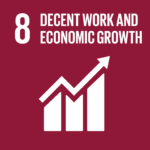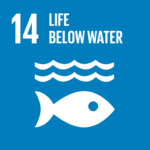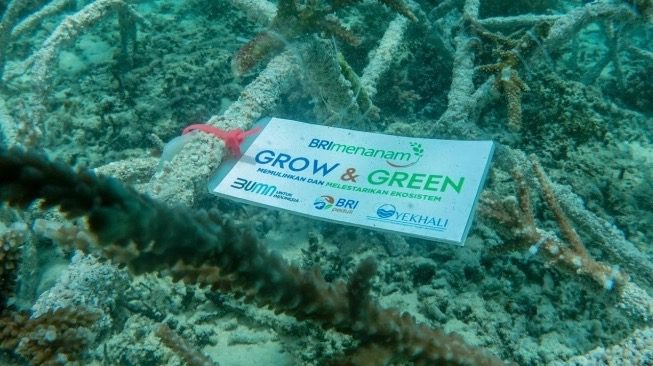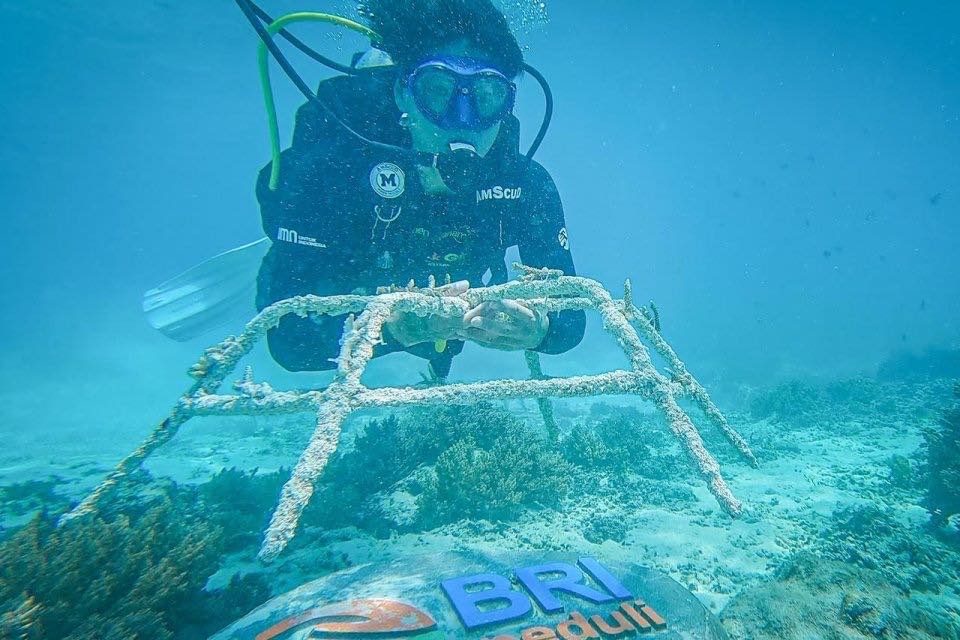BRI, Indonesia’s state-owned bank, through its sustainability initiative BRI Menanam – Grow & Green, with 1,500 coral fragments using 100 reef stars across 1,000 square meters in Gili Trawangan. In Gili Air, between 2,500 and 3,000 seagrass shoots were planted over an area of 625 square meters.
Nestled in North Lombok, the Gili Matra islands—comprising Gili Trawangan, Gili Meno, and Gili Air—are world-renowned for their crystal-clear waters and vibrant underwater biodiversity. These marine ecosystems serve not only as a natural sanctuary for protected species like sea turtles but also as the backbone of the region’s tourism economy.
However, beneath the surface beauty lies a growing concern. Destructive fishing practices and unchecked marine activities have threatened Gili Matra’s fragile reef systems and seagrass meadows, essential habitats for marine life.
RELEVANT SUSTAINABLE GOALS



BRI Menanam: A Green Partnership for Blue Waters
In response, the local community formed POKMASWAS Gili Matra (Community-Based Marine Resource Surveillance Group) in 2021. Comprising fishermen, entrepreneurs, and local residents, the group has been the frontline defender of Gili Matra’s marine ecosystems.
Their mission: to ensure that fishing practices remain sustainable and the region’s ecological integrity remains intact. But protecting the seas takes more than vigilance—it requires collaboration and resources.
Enter BRI, Indonesia’s state-owned bank, through its sustainability initiative BRI Menanam – Grow & Green. Partnering with POKMASWAS and stakeholders such as the BKKPN Kupang and YEKHALI (Yayasan Ekonomi Keanekaragaman Hayati Laut Indonesia), BRI has stepped in to support both environmental restoration and community empowerment.
The initiative focuses on restoring coral reefs and seagrass beds, while also training and equipping local residents involved in marine tourism. The aim is twofold: restore marine ecosystems and promote long-term economic sustainability.
As part of the program, BRI has transplanted 1,500 coral fragments using 100 reef stars across 1,000 square meters in Gili Trawangan. In Gili Air, between 2,500 and 3,000 seagrass shoots were planted over an area of 625 square meters. These measures are designed to regenerate vital marine habitats, stabilize coastal ecosystems, and attract more marine life.
The program also includes underwater clean-up activities to keep the seabed free of debris—creating a safe haven for biodiversity to thrive.
Empowering Eco-Tourism and Local Livelihoods
Beyond the ecological work, BRI’s initiative invests in human capital. Ten local participants have received certifications as Eco-Divers and Trainer Divers, equipping them with skills for sustainable marine tourism. Additionally, snorkeling guide training and tourism infrastructure support are part of efforts to boost service quality and draw more visitors.
“Thanks to the program, we’ve seen a rise in fish populations and healthier coral growth,” said Hasanuddin, Vice Chairman of POKMASWAS Gili Matra. “It has also enhanced the islands’ appeal to tourists, which helps our economy.”

Agustya Hendy Bernadi, Corporate Secretary of BRI, emphasized that BRI Menanam – Grow & Green reflects the bank’s broader commitment to environmental responsibility. “This program is not just about planting coral—it’s a climate action initiative. We hope it brings lasting ecological benefits and uplifts the local economy,” he said.
Since 2022, BRI has transplanted 3,930 coral fragments across 2,458 square meters and restored hundreds of square meters of seagrass beds. The program forms part of the broader Grow & Green Coral Reef initiative, aimed at preserving marine biodiversity and combating the impacts of climate change.
The restoration of Gili Matra’s reefs isn’t just a local story—it’s a blueprint for how public-private partnerships can protect marine ecosystems while supporting community welfare. As Indonesia continues to balance tourism with sustainability, the work in Gili Matra stands as a hopeful example of harmony between people and the planet.
In Hasanuddin’s words: “It’s satisfying to witness the community come together to restore the sea. May this effort continue, guided by shared responsibility and care for our marine heritage.”
Lead image courtesy of BRI (Grow & Green and Underwater Clean Up in Gili Matra, North Lombok – Indonesia)
You may also be interested in :
Indonesia’s Nusa Penida and Gili Mantra Declared Particularly Sensitive Sea Areas





